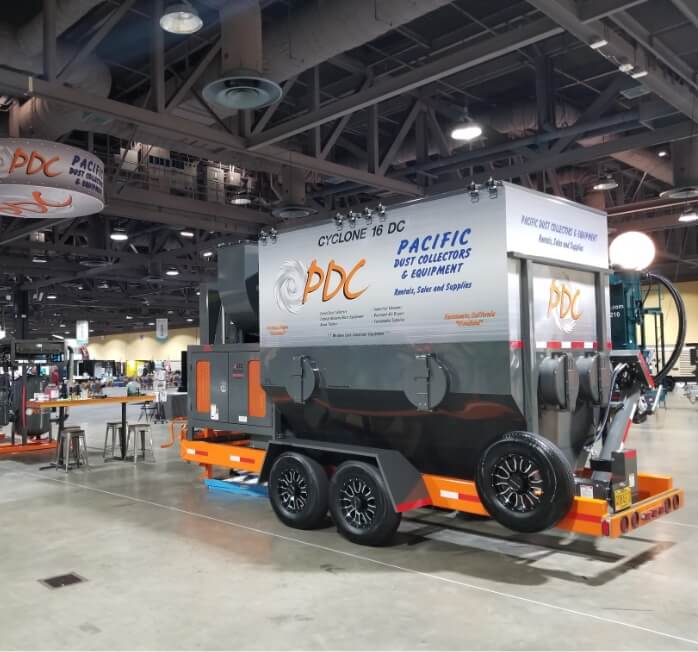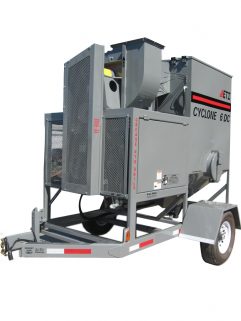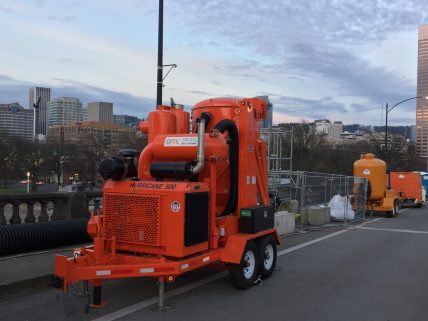
Wood dust and particulate in the air is more than a health hazard; it's also a safety hazard. Wood dust is a highly flammable material, and the combustion rate depends upon the surface area of the burned objects or particles. For instance, a large block of wood has a much lower surface area than an equal mass of sawdust. Also, the smaller the dust particles, the more rapidly and violently they combust.
In certain scenarios, super fine wood dust, known as wood flour, is ten times more explosive than gasoline. Often, the initial explosion blasts more dust airborne, and a violent cycle of explosion and dispersion begins until all of the potential fuel is consumed. So if you wouldn't feel safe working in a room full of gasoline fumes, you shouldn't be working in a room full of fine wood particulates.
We only need fuel, oxygen, and an ignition source for such an event. Once you add up the OSHA fines, repairing and replacing equipment and facilities, and any possible legal actions brought to bear, it often marks the end of a business. So how do we mitigate these risks and continue to stay in business? Not to worry, PDC Rentals has you covered. If you follow these four basic principles of dust collection, your workshop will be fine.
1. Collect Dust at the Source
Possibly the most important factor in wood dust collection is ensuring you collect the dust at the source. Before you begin any work, position the suction hood as close as possible to the source—lathe, grinder, or other woodworking machinery. dust must be picked up as it's created and directed into the collector. If you lose the dust to your shop air, collecting it becomes futile. You will inhale that dust and sweep it from your machines and floor.
2. Monitor your air volumes
You can accurately determine the efficiency of your system’s dust capture with a quick visual inspection. For example, inadequate air volume/CFM allows dust to reach the floor and escape into the air. Ensuring your ducting is large enough in diameter and efficiently laid out are two ways you can minimize risk.
Most woodworking equipment requires about 250-1000 CFM. The airflow or CFM needed will vary depending on the size and number of woodworking tools running simultaneously. If a piece of equipment loses a lot of chips or emits a visible plume of fine dust, it needs more airflow.
3. A Cyclone Separator is your friend
Separating the bulk of the wood waste from the airstream before reaching the filter keeps the system from clogging. A collector that dumps all of the dust directly into the filter (using the filter itself as a dust bin) is an inferior design. It will reduce system airflow/CFM and filter efficiency, not to mention that it won't keep your shop clean. Remember, you are trying to maintain sufficient airflow/CFM at the woodworking machine to prevent dust loss. If the filter clogs too quickly, this becomes impossible.
A cyclone separator can exceed 99% dust separation efficiency, allowing only a minimal amount of fine dust to pass to the filter.
4. Use a High-Quality Filter
The final stage in dust collection is filtering the fine dust. It doesn't make sense to go through all the trouble of collecting the dust if you allow the finest particulates to pass through the filter and back into the shop air. The finest dust is the most unhealthy and hazardous. At the PM10 range, inhalation is inevitable.
Effective filtration requires a quality filter media of sufficient quantity/surface area. You want to filter nearly 100% down to the smallest particle (10 microns or less in diameter. HEPA is also a must)
Before renting a dust collector, you should ask a few questions:
· What filters and equipment are supplied in the rental agreement?
· What is its efficiency rating?
· Do you have a specification sheet, and would you mind reviewing it with me?
· Can you show me any documentation that the filter media has been tested by a third-party agency?
Don't let dust collection be an afterthought. Instead, follow these four fundamentals to ensure a safer, healthier, and more enjoyable workshop environment.
Pacific Dust Collectors & Equipment is the leading expert in industrial dust collectors. Our equipment utilizes the latest technology to ensure that the air in your factory is safe. Reach out to us today for an assessment of your factory and a quote.



